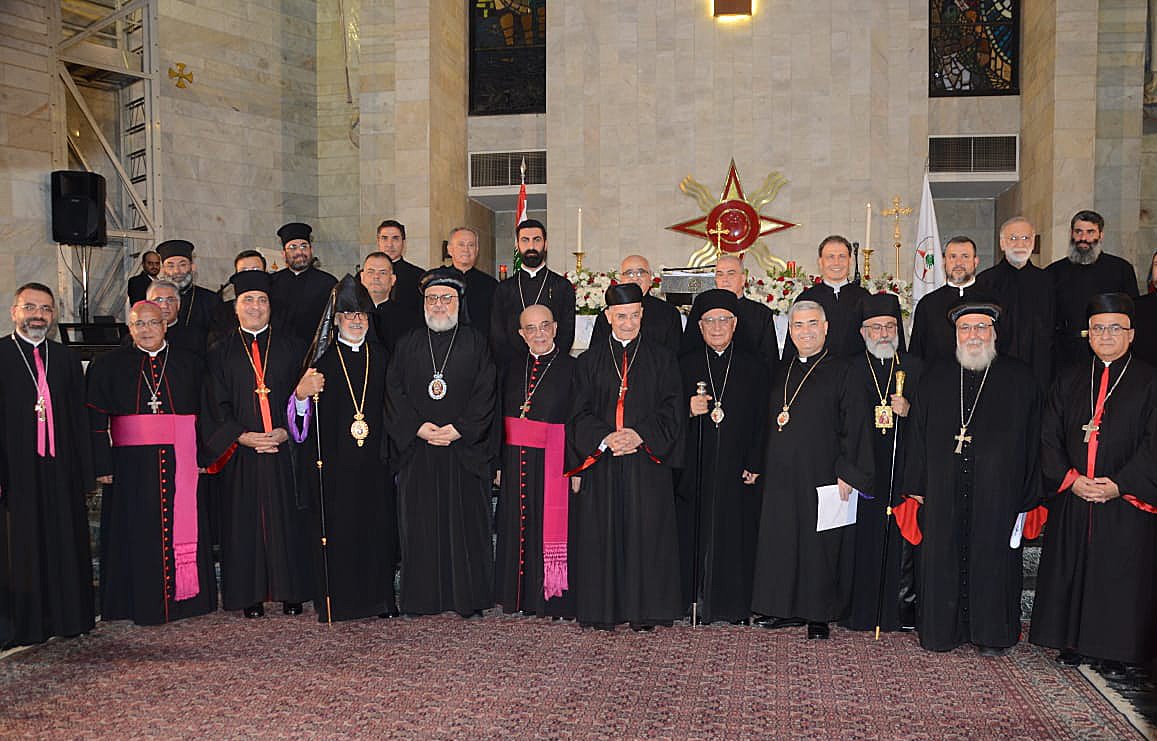
Solidarity for Iraqi Christians expressed in prayer service in Beirut
In Lebanon, Christian leaders gathered for an evening of prayer for Iraq and the beleaguered Chaldean Catholic Church.
“Our church in Iraq is going through difficult circumstances,” Chaldean Bishop Michel Kassarji of Beirut said at the Aug. 12 solidarity prayer gathering at the Chaldean Cathedral of Archangel Raphael in Baabda, outside of Beirut, with representation by patriarchs, bishops and priests from Catholic and Orthodox churches.
“We will not surrender and the Lord is the one who protects us. Spread your light, O Lord, and bless us, bless our shepherds, bless your priests and your consecrated people who carry the good news of your Gospel, bless Iraq and its people, bless the Chaldean Church, bless Lebanon, bless our countries,” Bishop Kassarji said.
“God placed us on this holy land, the land of Abraham the Prophet, the land of Ur of the Chaldeans,” Bishop Kassarji said, in reference to Iraq, where the roots of the Chaldean Church go back to the early Christian centuries.
The prayer appeal follows the announcement in July by Cardinal Louis Sako, patriarch of Chaldean Catholics in Iraq, to withdraw from the patriarchal see in Baghdad and relocate to a monastery in the Kurdistan region.
That voluntary departure from the patriarchal headquarters follows the decision of Iraqi President Abdul Latif Rashid, who revoked a decree that formally recognized the cardinal as Chaldean patriarch in the country.
A decree of 2013 by Rashid’s predecessor granted this authority to Cardinal Sako.
He was appointed patriarch in 2013 and elevated to cardinal by Pope Francis in 2018.
In his July 15 announcement, Cardinal Sako said: “It is unfortunate that we in Iraq live in the midst of a wide network of self-interest, narrow factionalism and hypocrisy that has produced an unprecedented political, national and moral chaos, which is taking root more and more. May God help the helpless Iraqi Christians.”
Before 2003, the number of Iraqi Christians was more than 1.5 million and is now estimated at less than 200,000, due to waves of emigration, in particular following uprooting by the Islamic State in 2014.
“Our faith is firm like a rock, no matter how severe the trials are, we will remain this seed in our countries,” Bishop Kassarji stressed at the prayer gathering.
Bishop Kassarji pointed out that Patriarch Sako, like all patriarchs who preceded him, “contributed to raising the name of the Chaldean Church in Iraq and the world.”
“I assure you that the bells of the churches and the struggle of the clergy … will be the leaven for the continuity of this blessed land, which is a message to the entire universe,” he said.
The prayer gathering took place under the auspices of Lebanese Cardinal Bechara Rai, patriarch of Maronite Catholics. Referencing the Gospel verse of Mark 5:8, “Unclean spirit, come out of the man,” in his homily, Cardinal Rai lamented the evil influences in our time, particularly among world leaders.
“Today’s world, especially its rulers, put God aside, dispense with his decrees and commandments, surrender to their interests at the expense of the common good, and commit injustice and tyranny and ignite the fire of conflicts and wars, without any twinge of conscience. This means that evil and evil forces are in control of them,” Cardinal Rai said.
The leader of the Maronite Church lifted up “the tragedy of dear Iraq, its people, the Chaldean Church and other churches and Christians.”
Cardinal Rai also pointed to the “tragedies in Syria, the Holy Land and Lebanon, where God manifested himself in his Old and New Testaments, and laid the roots of the Christian culture that enriched these countries with their civilization.”
“By virtue of our evangelical message in these countries where God wanted us to be, we remain steadfast in faith, hope and love, and we are determined to live together in a spirit of brotherhood, cooperation and mutual respect with all citizens,” Cardinal Rai said.
“May God accept our prayers and bestow the gift of peace upon dear Iraq, our sister Chaldean Church, patriarchs, bishops, clergy, believers and the countries of the Middle East and our churches,” he said.
—Doreen Abi Raad, OSV News

